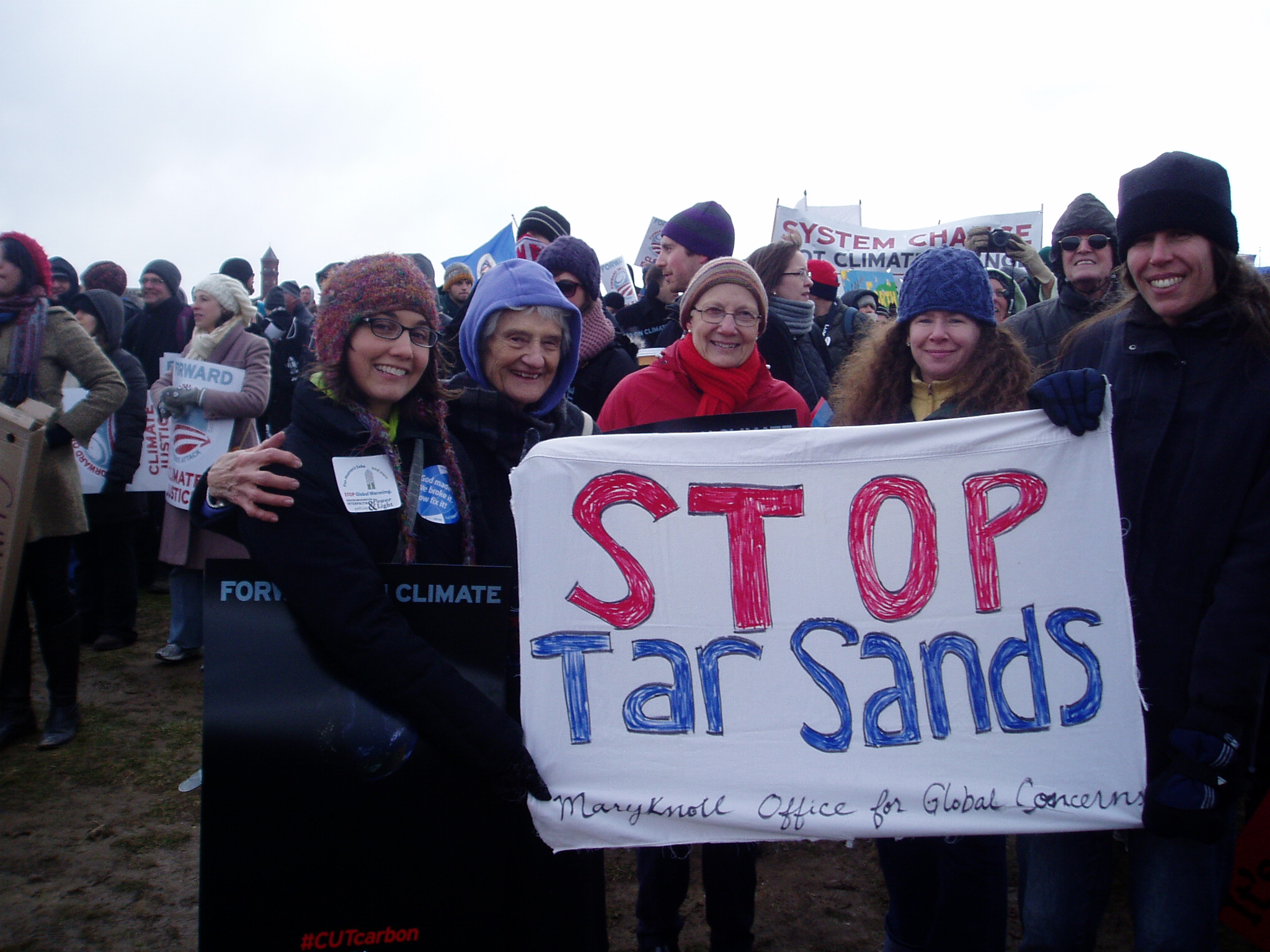Keystone XL: Challenges to pipeline
John Simurdiak, a student at St. Norbert’s College who is an intern with the Maryknoll Office for Global Concerns this semester, prepared the following article for the March-April 2014 NewsNotes.
John Simurdiak, a student at St. Norbert’s College who is an intern with the Maryknoll Office for Global Concerns this semester, prepared the following article for the March-April 2014 NewsNotes.
Photo, left to right: Jenn Svetlik, Sr. Roni Schweyen, MM, Marie Dennis, Judy Coode, Fr. Jack Sullivan, MM, and Rhegan Hyypio at the February 2013 “Forward on Climate” demonstration on the grounds of the Washington Monument.
When the Canadian energy company TransCanada first applied for a presidential permit that would enable the construction of a new tar sands pipeline running from Alberta to Nebraska, the request was rejected by President Obama on the grounds that not enough time was given to complete a proper evaluation. The application was resubmitted in the spring 2012, and has been waiting for an answer from the president ever since.
In July 2013, President Obama clarified in a speech that he would not approve of the Keystone XL pipeline if it would make a significant contribution to the problem of carbon pollution. While the environmental impact of the pipeline is not the only factor being taken into consideration by the president, it is undeniably the greatest cause of controversy, and the greatest obstacle for TransCanada and the proponents of the pipeline.
The U.S. State Department released its final Supplemental Environmental Impact Statement on January 31; its finding that the environmental impact of the proposed pipeline would be negligible has failed to convince those already in opposition to the project.
It is widely accepted that refinement of tar sands, being 17 percent more carbon intensive than average standard crude oil, has a significantly negative impact on the environment. One of the points made in the report, however, is that the Keystone XL pipeline is nothing more than a means of transportation, asserting that the project would do little, if anything at all, to stop the expansion of the tar sands industry in Canada. (Alternative methods of transportation, such as rail, have been found to be two to 2.5 times as costly as the proposed pipeline.) The State Department’s claim also relies on the assumption that the price of oil will rise to exceed $105 per barrel by 2020, noting that many alternative projects that have been proposed will not be profitable if oil prices stay under $100 per barrel. The future of oil prices however remain very uncertain, as other experts such as the traders of the Chicago Mercantile Exchange predict that prices will drop to $73 per barrel by 2019.
Another concern for environmentalists and local landowners is that the Keystone XL’s leak detection system would fail to catch leaks smaller than 500,000 gallons per day. Potential spills would be nearly impossible to clean up because, unlike conventional oil, tar sands sink when spilled in waterways. Both of these concerns are acknowledged by the State Department’s report.
The environmental impact of the pipeline remains hotly contested despite the State Department’s report, but it is not the only point of contention. Before approving the project, President Obama still needs to decide whether or not the tar sands pipeline is in the United States’ national interest. Like most environmental issues, the debate would appear to be about whether the economy takes precedence over the environment or vice versa. Opponents of the pipeline say that the proposed pipeline is not in our national interest in either area: Since the vast majority of oil to be sent down to refineries in the Gulf will be for exportation to world markets, the project would not help to make the U.S. any more energy independent. Gas prices in the U.S. would not decrease, but would actually be expected to increase in the Midwest, where selling oil to world markets is currently not an option. It has also been determined that the project would employ 3,900 construction workers, less than 2,000 per year, 15 temporary contractors, and only 35 jobs would be permanent. In addition, only 10 percent of these construction jobs would be filled locals, those living along the route of the proposed pipeline. In contrast, agriculture alone in the states through which the pipeline is to pass employs over 570,000. In an economy of 150 million working people, the economic impact of this project would be negligible.
With a guaranteed negative impact on the environment, the risk of devastating effects on the communities living along the route, and little economic gain, we can only hope that President Obama recognizes that the proposed Keystone XL project is not in our national interests, and should not receive approval.

